
SEPTEMBER 22,


SEPTEMBER 22,
Kazeem Badmus
THE Minister of the Federal Capital Territory, Nyesom Wike, may be arrested on arrival in New York for the United Na ons General Assembly, OSUN DEFENDER gathered.
Wike, one of the posterboys of the Bola Tinubu administra on during the outgone week was alleged to have bought at least three luxury homes in Winter Springs, Florida, from perceived proceeds of corrup on.
It was learnt that the former governor of Rivers State also reportedly acquired the mul -million dollar foreign proper es in the name of his wife, Jus ce Eberechi Suzze e NyesomWike, a serving judge of Nigeria’s Court of Appeal.
Further facts revealed that the duo have also obtained a United States Quit Claim Deed, transferring the proper es to their children. In the country’s law, Quit Claim Deed is one of the simplest property transfer documents in U.S. real estate law that enables owners of proper es to transfer such ownership to their children.
According to series of posts on his verified Facebook page, ac vist and former presiden al candidate, Omoyele Sowore, the acquisi ons were through ques onable means, claiming that the proper es were shared among Wike’s children, amoun ng to concealment of ownership and laundering of stolen funds.
He wrote, “It turns out
that interna onal thief Nyesom Wike has three different proper es in Winter Springs, Florida. All of them were hidden under the name of his wife, who also serves as a Court of Appeal judge in Nigeria, and shared out to his children,” accusing the minister of “trafficking proceeds of crime.
“It allows one person, the grantor, to sign over whatever ownership interest they may have in a property to another person, the grantee. Crucially, it offers no guarantees the grantor makes no promise that the tle is valid, clear, or even legi mate. In short, it transfers “whatever interest” the grantor has, nothing more.
“Ordinarily, quit claim deeds are used for rou ne family transac ons, a husband adding a wife to a tle, parents transferring property to children, or heirs resolving paperwork a er an inheritance. Because they bypass warran es and detailed tle checks, they are cheap, quick, and o en escape close scru ny.
“But this simplicity is exactly why kleptocrats love them. Corrupt officials exploit “quit claim deeds” to launder stolen wealth. By transferring proper es into the names of wives, children, or other rela ves, they hide their true ownership. On paper, the transacons appear to be ordinary family planning.
“In reality, they are deliberate strategies to conceal the original source of illicit funds. No public sale, no market-value exchange, no visible money trail, just the quiet concealment of corrup on beneath harmless looking paperwork.
“This is precisely what Wike has done. Proper es
in Florida, purchased with the proceeds of corrupon, were quietly moved into the names of his wife, herself a senior judicial officer in Nigeria, and their children. The pa ern is a textbook case of laundering stolen Nigerian wealth into U.S. real estate, using quit claim deeds as legal camouflage.
“Under U.S. law, such transac ons amount to money laundering and trafficking in stolen property, serious crimes punishable under both state and federal statutes. They are also subject to asset seizure and forfeiture under the U.S. Department of Jus ce’s Kleptocracy Asset Recovery Ini a ve.”
According to Sowore, he has already contacted the Office of the A orney General of Florida, James
Uthmeier, to no fy U.S. authori es of the alleged acquisi ons.
He insisted that the ma er falls under “firstclass felony” offences under American law, poten ally exposing Wike to inves gaon or arrest if he sets foot in the United States.
OSUN DEFENDER reports that the allega ons surface ahead of Wike’s expected par cipa on at the United Na ons General Assembly (UNGA) in New York this week.
The minister, according to further findings, could be detained or subjected to ques oning by U.S. law enforcement agencies if the pe on is acted upon.
U.S. authori es have in the past prosecuted foreign officials for laundering illicit funds into American real estate.
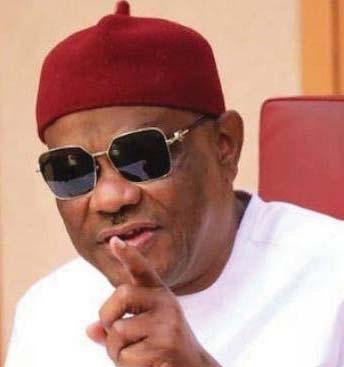
•Wike
Notable cases include probes into Nigerian policians and business elites who secretly acquired proper es through rela ves or shell companies, triggering enforcement of an -money laundering laws.
Independent inves gaons by Nigerian media have also raised ques ons over Wike’s financial dealings. Peoples Gaze e previously published documents alleging that the minister allocated prime Abuja lands to his wife and other family members in viola on of due process, further fueling suspicions of abuse of office.
Cri cs argue that the case highlights a wider pattern in which Nigerian pub-
Kazeem Badmus
THERE is tension within the camp of the Minister of Marine and Blue Economy, Mr. Gboyega Oyetola, and that of immediate past Na onal Secretary of the All Progressives Congress (APC), Senator Iyiola Omisore, over who picks the
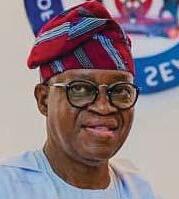
party’s cket for the August 08, 2026 governorship elecon in Osun State.
Since the former naonal secretary announced his inten on to contest the elec on, poli cal dynamics in Osun APC have changed.
Before the entrance of the former deputy governor of the state, ge ng the cket was said to be in favour of a former two-term Commissioner for Finance under the
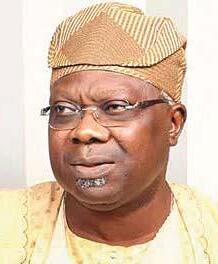
administra ons of Ogbeni Rauf Aregbesola and Oyetola, Mr. Bola Oyebamiji. Oyebamiji was said to enjoy the backing of the immediate past governor, with a majority of the ministers’ supporters roo ng for Oyebamiji.
However, sources in the APC told OSUN DEFENDER that members of the party who want Oyebamiji to get the cket have become jittery and are no more as confident with Omisore’s entrance.
Also, the sources said Oyetola’s loyalists were seeing the blunt approach of the former Na onal Scribe as a direct a ack on the Marine Minister.
OSUN DEFENDER reports that Omisore, during a mee ng with APC ward
on Page 2
lic officials allegedly siphon funds into overseas assets while the country grapples with underdevelopment.
Sowore framed his peon as part of a broader campaign to expose and disrupt what he described as “transna onal corrupon networks.”
The moun ng allegaons have intensified pressure on the FCT Minister, who has remained silent on the ma er. Neither Wike nor his aides have issued a response to Sowore’s claims as at the me of filing this report.
Analysts say Wike’s presence at UNGA could now prove controversial, with his interna onal movements poten ally shadowed by corrup on allega ons that may trigger diploma c and legal implica ons for Nigeria.
Reac ng to the posts, the Minister’s media aide downplayed the ma er saying Wike has never denied the proper es owned by his wife.
“Someone is sourcing PUBLIC DOCUMENTS that are readily available on the websites of ins tuons concerned and making noise about them. The ques on is, did Wike deny that his wife has proper es in the US? No, he didn’t.
“THIEF, Cash vist and RAPIST Sowore thinks everybody is like him, who lied in his ASSETS DECLARATION that he has just N5m and one Toyota Car.
“Person wey dey collect GRANTs running into millions of Dollars claimed that he has N5m and one Toyota Car,” Olayinka wrote on his Facebook page.
MONDAY, SEPTEMBER 22, 2025
Yusuf Oketola
THE Na onal Secretary of the African Democra c Congress (ADC), Ogbeni Rauf Aregbesola, has urged African leaders to adopt the revolu onary ideals of late Cuban leader, Fidel Castro, in building a more just, humane, and resilient society.
Aregbesola made the call in Abuja during a centenary celebra on in honour of Castro, organised by the Cuban Embassy in Nigeria and the Nigerian Labour Congress (NLC).
Speaking on behalf of the Nigerian Movement of Solidarity with Cuba, Aregbesola reiterated the long-standing demand for the United States to li its 63-yearold economic, cultural, and financial embargo on the island na on.
“As we honour Fidel Castro, we re-echo the annual demand of the United Na ons General Assembly that the United States end its embargo on Cuba. It is me for jus ce,” he declared.
The ADC chie ain praised Cuba’s resilience in the face of economic and poli cal pressures, no ng that the na on has consistently demonstrated humanitarian leadership across the world.
He cited Cuba’s record of deploying thousands of doctors and nurses to countries in need, including during the COVID-19 pandemic, when the country sent medical teams abroad while keeping its borders open.
Aregbesola also highlighted Cuba’s historic role in Africa’s libera on struggles, par cularly

•(Middle) The National Secretary, African Democratic Congress (ADC), Ogbeni
tinary celebration in honour of Fidel Castro, organised by the Cuban
in
at the
and the Nigerian Labour Congress (NLC), in Abuja, recently
its decisive interven on in Angola against Apartheid South Africa.
He recalled that the Cuban military’s support contributed significantly
to Namibia’s independence and paved the way for the eventual collapse of white minority rule in South Africa.
Kazeem Badmus
REACTIONS have trailed the award of a N678 million contract for the reconstrucon of the Sango-Timi Shrine and Grove at the palace of Timi of Ede, Oba Adesola Lawal, by the Osun State Government.
A document sighted by OSUN DEFENDER showed that the Sango-Timi Shrine and Grove was one of the contracts awarded by Governor Ademola Adeleke’s administra on.
Reac ng to the development, the Coordinator, Centre for Social Jus ce and Public Protec on (CSJPP), Akin Akanji, slammed the state government for awarding such an amount to the reconstruc on of the shrine.
Akanji said other crical sectors needed the a en on of the state government, accusing Governor Adeleke of not ge ng his priori es right.
He said, “It is indeed sad. This government is dri ing away from reality day by day, and unfortunately, the people of Osun are the ones suffering the consequences.
“The state educa on, agriculture, and youth sector is begging for a major revamp, and while the government is shouting that there is no fund due to the seizure of local government alloca ons, it is awarding over N600 million to reconstruct a shrine.
“The ques on we should ask is, would Adeleke have approved that contract if it were in another town? His overconcentra on on Ede is
ge ng out of control.
“Adeleke should not forget that he is the gov-
ernor of Osun State and not Ede, and people are watching. This is Osun
taxpayers money, and he is behaving as if Ede is the only town in the state. He
should be cau oned by those who genuinely love him.”
Agovernorship aspirant on the pla orm of the All Progressives Congress (APC) in the 2026 guber elec on in Osun State, Mr. Kunle Adegoke (SAN) has asked the media to be responsible in its repor ng of poli cal ac vi es in the state.
Addressing members of a support group, KRAD Vanguard in Osogbo, on Saturday, Adegoke noted that the media plays a pivotal rule in de-
mocracy which cannot be overlooked.
He also carpeted the administra on of Governor Ademola Adeleke, saying that the present government has not jusfied its elec on, stressing that the APC will takeover from him a er the next elec on.
The legal luminary also praised the support group for its efforts at galvanising the backing of party members and residents of Osun for the success of his ambi on.
“What you’ve done so far is proof of determinaon to free Osun from
misgovernance. Come 2026, we will lead this state.
“The press is a strong estate. It has shaped naons. We can’t overlook the role you’ve played.
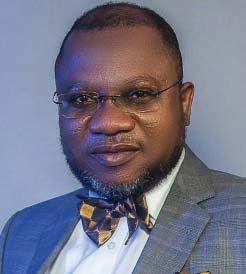
We appreciate you.
“We inherited the legacy of Awolowo and his colleagues. What we are doing here today is laying the founda on of a bright future. Let’s stay strong. Our efforts will not be in vain,” he declared.
The mee ng ended with thunderous applause as the K-RAD Vanguard, led by notable indigenes including Rasheed Rasheed, pledged stronger support, while Adegoke reaffirmed his vision to reposi on Osun under the progressive fold.
•Continued from page 1
chairmen recently, said that President Bola Tinubu asked him to contest the 2026 poll.
In another mee ng with the Vice Chairmen of the party across local governments in the state, Omisore threw shades at the other gubernatorial aspirants in APC.
The former deputy governor said those who begged him to contest next year’s gubernatorial elecon are be er than the aspirants who have shown interest under the party.
Following the remarks, loyalists of the former governor took to social media to condemn Omisore, accusing him of throwing the party’s leadership under the bus.
In a Facebook post, a loyalist of the Marine Min-
ister, Tunmise Ajiboye, attacked Omisore, telling him his governorship ambi on is an effort in fu lity.
Ajiboye in the post said Omisore should not have contested again a er resigning as the Na onal Secretary of the party controversially.
But a few hours a er the post, a former Special Adviser on Educa on to Oyetola, who has now joined Omisore’s camp, Jamiu Olawumi, shared a post attacking the Minister and his rumoured anointed aspirant, Oyebamiji.
Olawumi posted a story on his Facebook page where a socio-poli cal group, Osun Poli cal Fron ers, expressed deep concern over the acvi es of the immediate past Governor and his exFinance commissioner.
In the now-deleted post, the group had warned both
Oyetola and Oyebamiji to desist from undermining the achievements of President Bola Tinubu in Osun State.
Meanwhile, following the a ack by the two camps, the State Working Commi ee of APC in Osun issued a code of conduct to the party’s governorship aspirants.
Its chairman, Tajudeen Lawal, in a statement, said the move was to sanise the APC and promote peace, unity, and tranquillity towards the upcoming governorship primary.
Parts of the measures include the outlawing of any member of the execu ve officers of the party at all its levels, be it state, senatorial, local government, ward, and the reinstated local government council chairmen and councillors from involving
themselves as the coordinator of any governorship aspirant.
The party also said it ordered the spokespersons of the governorship aspirants, their leaders, members, and supporters, to desist from using derogatory and abusive language during the course of canvassing for their aspirants, adding that failure to do so would attract an instant sanc on in line with the cons tu on of the party.
According to the party chairman, some supporters and followers of the numerous APC governorship aspirants have been throwing cau on to the wind by needlessly verbally a acking either some of the esteemed party leaders, aspirants, or supporters of other aspirants within the same party.
“Fidel was simply a humanist who sought to make the world a better place and strived to do so by personal example. Under his leadership, Cuba became a medical superpower that touched millions of lives across con nents. During COVID-19, while many na ons shut their borders, Cuba extended a hand of solidarity by sending doctors and nurses to Europe, Asia, the Middle East, North America, La n America and Africa,” he said.
Reaffirming the importance of interna onal solidarity, Aregbesola stressed that African leaders must learn from Castro’s model of revolu onary governance, people-centred leadership, and commitment to jus ce.
“We Africans par cularly remember Cuba as the only country that came to our defence when Apartheid South Africa invaded Angola. Their crushing defeat of the Apartheid forces eventually led to the independence of Namibia and South Africa,” he noted.
In his response, Fernando Gonzalez Llort, President of the Cuban Ins tute of Friendship with Peoples (ICAP), expressed apprecia on for Nigeria’s enduring solidarity with Cuba.
He described the rela onship between the two countries as “a bond of shared struggle and mutual respect,” and assured that Cuba would never forget Nigeria’s consistent support at the United Na ons and other interna onal platforms.
VICE President Kashim She ma will be representing Nigeria and will give the speech elucida ng the posi on of Nigeria at the United Na ons General Assembly tomorrow. A week later, Nigeria will mark what ought to be a landmark sixty-fi h Independence Anniversary
The authority of Nigeria has waned, it is a far cry from the great expecta ons raised a er the lowering of the flag of the Bri sh coloniser in nineteen-sixty. It has been a classic case of promise unfulfilled. Not only has the country not fulfilled the promise of using it’s immense poten als to achieve a great leap forward, but it has retrogressed and lost the moral authority it once waved during for example the an apartheid and decolonisa on struggle. Lacking economic clout and moral fervour, Nigeria will have to be dexterous to make

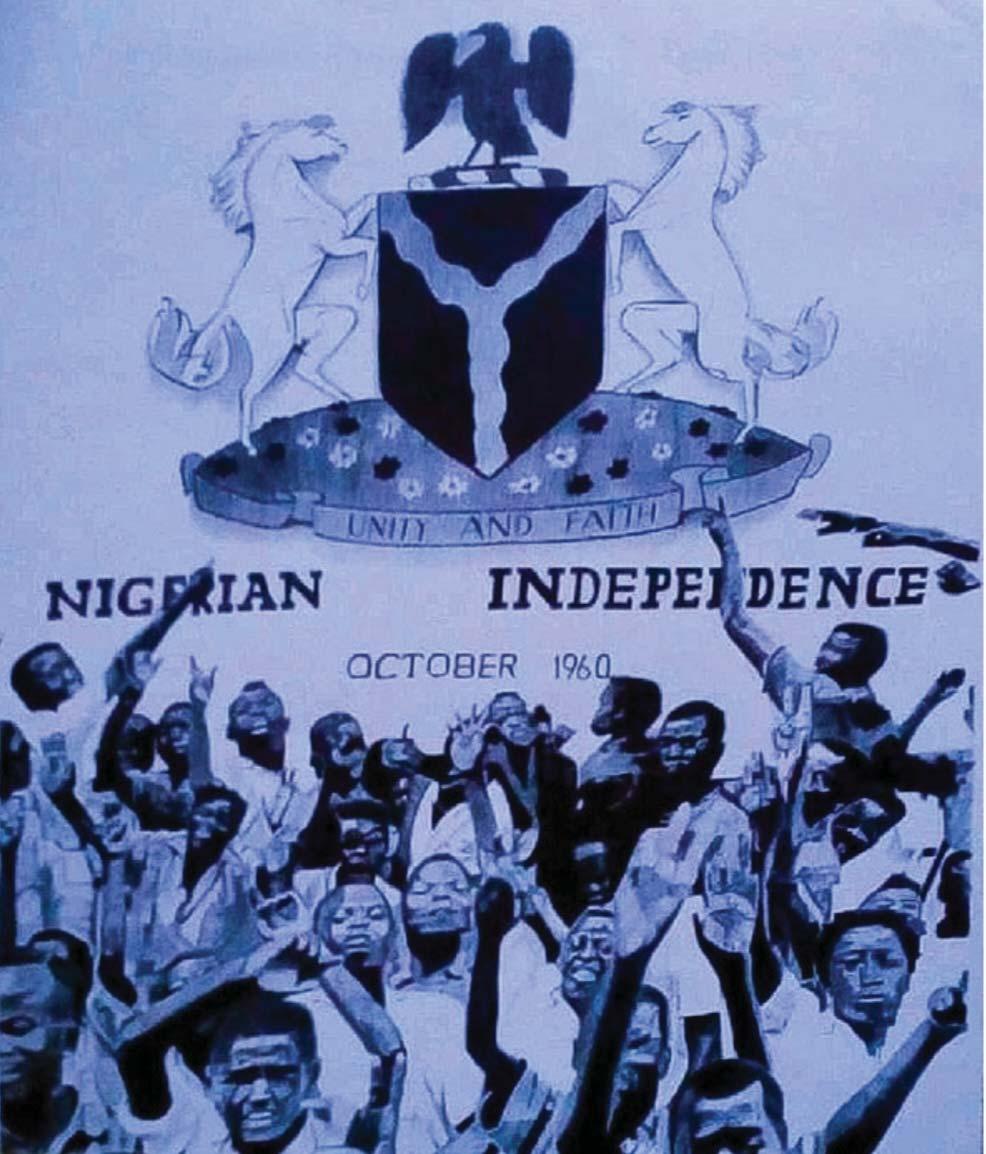
a great showing tomorrow.
The country has to take stock and reboot. The emphasis must be
on a shi to building a produc ve economy anchored on manufactured goods, value addi oning and the evolu on of an
“The country has to take stock and reboot. The emphasis must be on a shift to building a productive economy anchored on manufactured goods, value additioning and the evolution of an export oriented process”
export oriented process. All of the above will be difficult if not impossible without a return to an unambiguous federalist posi on.
Federalism implies that ‘you eat what you kill’ as a one me Prime Minister of Canada, John Diefenbaker famously stated and there can be no real advance without a return to the federalist tenor upon which indepence was anchored. Otherwise we labour in vain. A er this, there must be moral rearmament which must be built on rebuilding our ins tuons and agencies. Wishing the VP a good ou ng
By Wahab Abiona
RAUF Aregbesola, former Governor of Osun State, is remembered for his bold and innova ve approach to governance. Among his most enduring legacies is the introduc on of Nigeria’s first sub-na onal Islamic bond, popularly known as Sukuk. In 2013, under his leadership, Osun State issued a Sukuk worth about N11.4 billion, blazing the trail for a financing mechanism that has since become a mainstay of Nigeria’s debt strategy.
A Sukuk differs from convenonal bonds because it complies with Islamic law, which prohibits interest. Instead, it is asset-backed, with investors receiving returns from the performance of underlying projects. By venturing into this uncharted territory, Aregbesola not only created a fresh source of funding for Osun but also demonstrated to Nigeria’s financial regulators and investors that Sukuk could work locally.
The proceeds of the Osun Sukuk were directed at infrastructure, with educa on as the flagship sector. Several model high schools, of-
“Aregbesola’s decision to pioneer Sukuk financing underscores the power of innovative thinking in governance. By blending financial creativity with developmental needs, he not only delivered infrastructure to Osun but also left a lasting imprint on Nigeria’s financial landscape”
ten referred to as “mega schools,” were constructed across the state in Osogbo, Iwo, Ife, Ilesa, Ikirun, and other towns. These schools became the visible face of the bond, represen ng a tangible link between innova ve finance and improved social infrastructure. The Sukuk enabled the state to deliver long-term assets without the heavy burden of conven onal interest-bearing loans, while also attrac ng investors seeking ethical, Shari’ah-compliant opportuni es.
The Osun experiment was more than a local financing decision; it became a na onal template. In 2017, the Federal Government of Nigeria followed the path Aregbesola pioneered by issuing its first sovereign Sukuk, raising N100 bil-
lion to fund road projects na onwide. Since then, the federal Sukuk programme has grown steadily, with mul ple tranches issued to finance large-scale infrastructure such as highways and bridges. Other states, notably Lagos, have also explored Sukuk to fund their development plans, while corporate issuers have shown interest in tapping into this ethical finance
market.
Today, Sukuk is a recognised instrument in Nigeria’s debt management framework, ins tu onalised by the Debt Management Office and embraced by both domes c and interna onal investors. From a single issuance in Osun, it has matured into a financing vehicle suppor ng projects across the country.
Publisher – Moremi Publishing House Ltd.
Asst. News Editor – Yusuf Oketola
Asst. Features Editor – Kazeem Badmus
Deputy Photo Editor – Shola Aderinto
Deputy Graphics Manager – Zainab Olalere
Produc on Controller – Petkola Taiwo Ibitowa
OSUN DEFENDER is published by Moremi Publishing House Limited, Behind Oranmiyan Building, Gbodofon, Off Gbongan Road, Osogbo, Osun State.
ISSN : 0794-8050
Telephone : 0809-301-9152
Website : www.osundefender.com/index.php e-mail : osundefenderhq@gmail.com osundefenderbank@gmail.com
Aregbesola’s decision to pioneer Sukuk financing underscores the power of innova ve thinking in governance. By blending financial crea vity with developmental needs, he not only delivered infrastructure to Osun but also le a lasting imprint on Nigeria’s financial landscape. His ini a ve proved that ethical, asset-backed instruments can drive real development, and it remains a landmark in the na on’s economic history.
All correspondence to the above email addresses.
•Abiona is a lawyer, taxconsultant and public affairs analyst

MONDAY, SEPTEMBER 22, 2025 VOL. 20 NO 44 www.osundefender.com, email: osundefenderbank@gmail.com
POOR Nigerians who are terrorized by bandits and kidnappers are being taxed by President Tinubu. Nigeria’s current fiscal policies, which tax the poor while offering li le in return, fail to create the condi ons necessary for such ins tu onal development. Without structural reform, Nigeria’s economy will remain stuck in a cycle of low growth and high inequality. In 2026, dead Nigerians will pay tax through their bank accounts depending the amount of money they le behind. The new tax law will push more Nigerians to poverty and death. The presiden al Fiscal Policy and Tax Reform Commi ee has said that without a Tax ID, a taxable person may not be able to operate bank accounts, insurance policies, pension accounts, or investment accounts.
Where will poor Nigerians get money to secure Tax Iden ty Number? The Nigeria Tax Administra on Act (NTAA) mandates the use of Tax Iden fica on Numbers (Tax ID) for certain transacons. Understandably, many Nigerians have ques ons about what this means for banking, businesses, and everyday life. Tax ID will be used to tax the poor. Tax ID” is a term that unifies the different TINs issued by the Federal Inland Revenue Service (FIRS), Joint Tax Board (JTB), and State IRS.
Ul mately, your NIN (for individuals) and CAC RC number (for companies) will serve as your Tax ID, reducing duplicaon and simplifying compliance. Tinubu’s government’s current tax approach is taxing poor Nigerians to death with li le to show for it in terms of improved public services or infrastructure. Nigerian roads remain dilapidated, public schools are in terrible disrepair, and the health care system is on the brink of collapse.
“The government continuously imposes all sorts of taxes on businesses, ostensibly to shore up public revenue. The effect of all of this is the stifling of businesses while investors are fleeing abroad. Small and medium enterprises (SMEs), the backbone of Nigeria’s economy, that bear the brunt of these policies, have either scaled down operations or folded entirely, adding to the already alarming unemployment rate”
By
These reali es make it difficult for Nigerians to see the jus fica on for the government’s aggressive tax policies. Added to the foregoing is the failure of government’s Tax Reforms’ Bills in addressing tax injus ce.
Our country’s wealthy elites who live outside the tax net are notorious tax evaders, while ordinary ci zens who don’t earn even a frac on of what the elites earn bear the full weight of the government’s revenue drive. They are the unfortunate ones that are harassed and harangued by agberos who pass themselves off as tax collectors in the market places of our country. When their wares aren’t seized and carted to God-knows-where, they are told to “go and die“. It is this inequity that fuels ci zens’ resentment of government.
Since President Tinubu assumed office in May 2023, his administra on has enthroned an aggressive taxa on regime – a regime that is suffoca ng and straining ci zens and small businesses. The surge in taxes under the guise of economic reforms is pushing poor Nigerians deeper into poverty, exacerba ng exis ng inequali es and s fling opportuni es for real growth.
Amidst the economic strains which ci zens and businesses face is the fundamental ques on: can excessive taxa on lead to prosperity? The Tinubu administra on did not stop there. A ra of new taxes have since followed. A few days ago, the Central Bank of Nigeria announced a new increase in Automated Teller Machine (ATM) fees. Not to be beaten to the game of whom imposes the highest taxaon fees, the Nigerian Communica on Commission (NCC) announced that it has approved 50% increase in data charges.
In spite of the fact that the NCC claimed it approved 50% data charges, telecommunica on companies have gone ahead to hike data charges by over 200%, thus making internet access – once a crical tool for business and educa on- prohibi vely expensive for many. The Nigeria Customs Service (NCS) also joined in the madness by imposing a 4% charge on the Free On-Board (FOB) value of imports. Businesses have not been spared either.
The government con nuously imposes all sorts of taxes on businesses, ostensibly to shore up public revenue. The effect of all of this is the s fling of businesses while investors are fleeing abroad.
Small and medium enterprises (SMEs), the backbone of Nigeria’s economy, that bear the brunt of these policies, have either scaled down opera ons or folded en rely, adding to the already alarming unemployment rate.
A more progressive Personal Income Tax (PIT) regime - The NTA changes the income brackets and applicable tax rates for each bracket. Individuals earning NGN800,000 or less per annum will now be exempt from tax on their income and gains, while higher income earners will be taxed at a higher rate up to 25%. The Act also increases the tax exemp on threshold for compensa on for loss of employment or injury from NGN10million to NGN50million
Nigeria has enacted new tax reforms through four new laws signed on June 26, 2025: the Nigeria Tax Act (NTA), the Nigeria Tax Administra on Act (NTAA), the Nigeria Revenue Service (NRS) (Establishment) Act, and the Joint Revenue Board (Establishment) Act.
Gaze ed on 11 September 2025, the legisla on replaces over a dozen older statutes. The measures, effec ve from January 1, 2026, are intended to increase Nigeria’s tax-to-GDP ra o from around 10 per cent. A five per cent fuel surcharge included in the package has been postponed to limit cost-of-living pressures.
Those earning below ₦800,000 annually
Low-income earners remain largely outside the tax net. Annual incomes up to ₦800,000 are exempt from personal income tax, covering workers close to the minimum wage and much of the informal economy. Where records are absent, a presump ve tax will apply, with rates determined by the finance minister. Rent deduc ons of up to 20 per cent or ₦500,000 are also available. Food and educa on con nue to be VAT-exempt, shielding household budgets from further strain
Those earning above ₦800,000 annually
Individuals above this threshold face a progressive personal income tax structure. Rates rise from seven per cent up to 25 per cent for those earning above ₦50 million, compared with a previous 24 per cent ceiling. Taxable income now includes global earnings of residents, non-cash benefits such as rent-free housing, and capital gains from assets including cryptocurrencies. Gratui es are now taxable,
though compensa on for job losses up to ₦50 million remains exempt. Reliefs are available for primary residences and up to two vehicles.
Small businesses with turnover below ₦100 million
Small firms with turnover under ₦100 million and assets below ₦250 million are exempt from corporate income tax, capital gains tax, and a new four per cent development levy. Professional services firms are excluded from this category. Registra on with the Corporate Affairs Commission is required to access exemp ons, alongside a tax iden fica on number, which banks will demand for account opera ons. Businesses must also adopt digital tools such as e-invoicing.
The 2024 Global Hunger Index (GHI) does not in any way support the claim that “most Nigerians are not hungry.” It is true that Nigeria is not among the top twenty worst-performing countries on the index, but this does not mean that hunger is insignificant or that Nigerians merely “need more money for comfort.” The GHI measures serious indicators of hunger— undernourishment, child was ng, child stun ng, and child mortality—so being outside the top twenty only means that some other countries face even more severe crises. It does not mean Nigeria is free of hunger.
A closer look at Nigeria’s GHI scores over the last three years shows that the situa on has actually worsened, not improved. In 2022, Nigeria had a GHI score of 27.3 and ranked 103rd out of 121 countries with sufficient data. By 2023, the score had risen to 28.3, and the country slipped to 109th out of 125. The 2024 report maintains the same score of 28.3 and a similar ranking, placing Nigeria firmly in the “serious” hunger category. A higher GHI score reflects deeper food insecurity, meaning more Nigerians are suffering from undernourishment and malnutri on today than before. This deteriora on overlaps with the period of economic reforms and infla onary pressures that have intensified under the Tinubu administra on.
The report shows that over 10 percent of Nigeria’s popula on is undernourished, meaning tens of millions of Nigerians lack sufficient calories for healthy living. Child malnutri on remains alarmingly high, with about 31 percent of children under five affected by stun ng and roughly 6 percent suffering from was ng, a sign of acute malnutri on. Nigeria’s ranking of 109th out of 136 countries is far from encouraging. The GHI also warns of persistent challenges driven by infla on, insecurity, conflict in farming regions, and weak purchasing power—all of which con nue to worsen food access.
Using Nigeria’s absence from the top twenty to dismiss hunger is therefore misleading. The GHI provides clear and empirical evidence that hunger in Nigeria is both serious and worsening, regardless of poli cal spin. Economic reforms, inflaon, insecurity, and food price shocks have intensified food insecurity across the country during the Tinubu administra on. Nigeria may not be Somalia or Yemen, but the data show that hunger remains a serious and growing na onal problem affec ng millions, and downplaying it for poli cal reasons does not change the facts.
Donald writes via inwalomhe.donald@yahoo.com
OSUN DEFENDER is published by Moremi Publishing House Limited, Behind Oranmiyan Building, Gbodofon, Off Gbongan Road, Osogbo, Osun State. All correspondence to the Asst. News Editor, YUSUF OKETOLA, Telephone: 0809-301-9152. ISSN: 0794-8050. Website: www.osundefender.com Email: osundefenderbank@gmail.com, osundefenderhq@gmail.com